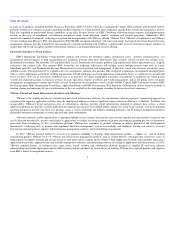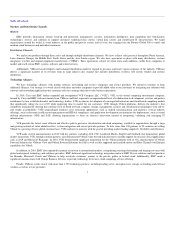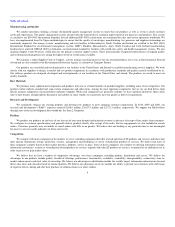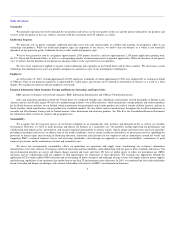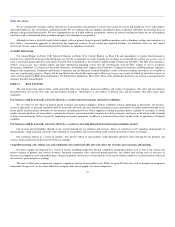EMC 2010 Annual Report Download - page 17
Download and view the complete annual report
Please find page 17 of the 2010 EMC annual report below. You can navigate through the pages in the report by either clicking on the pages listed below, or by using the keyword search tool below to find specific information within the annual report.
Table of Contents
There can be no assurance that companies with which we have strategic alliances, certain of which have substantially greater financial, marketing or
technological resources than us, will not develop or market products in competition with us in the future, discontinue their alliances with us or form alliances
with our competitors.
Our business may suffer if we cannot protect our intellectual property.
We generally rely upon patent, copyright, trademark and trade secret laws and contract rights in the United States and in other countries to establish and
maintain our proprietary rights in our technology and products. However, there can be no assurance that any of our proprietary rights will not be challenged,
invalidated or circumvented. In addition, the laws of certain countries do not protect our proprietary rights to the same extent as do the laws of the United
States. Therefore, there can be no assurance that we will be able to adequately protect our proprietary technology against unauthorized third-party copying or
use, which could adversely affect our competitive position. Further, there can be no assurance that we will be able to obtain licenses to any technology that we
may require to conduct our business or that, if obtainable, such technology can be licensed at a reasonable cost.
From time to time, we receive notices from third parties claiming infringement by our products of third-party patent or other intellectual property rights.
Responding to any such claim, regardless of its merit, could be time-consuming, result in costly litigation, divert management's attention and resources and
cause us to incur significant expenses. In the event there is a temporary or permanent injunction entered prohibiting us from marketing or selling certain of our
products or a successful claim of infringement against us requiring us to pay royalties to a third party, and we fail to develop or license a substitute
technology, our business, results of operations or financial condition could be materially adversely affected.
In addition, although we believe we have adequate security measures, if our network security is penetrated and our intellectual property or other
sensitive data is misappropriated, we could suffer monetary and other losses and reputational harm, which could materially adversely affect our business,
results of operations or financial condition.
We may become involved in litigation that may materially adversely affect us.
From time to time, we may become involved in various legal proceedings relating to matters incidental to the ordinary course of our business, including
patent, commercial, product liability, employment, class action, whistleblower and other litigation and claims, and governmental and other regulatory
investigations and proceedings. Such matters can be time-consuming, divert management's attention and resources and cause us to incur significant expenses.
Furthermore, because litigation is inherently unpredictable, there can be no assurance that the results of any of these actions will not have a material adverse
effect on our business, results of operations or financial condition.
Issues arising during the upgrade of our enterprise resource planning system could affect our operating results and ability to manage our business
effectively.
We are in the process of upgrading our enterprise resource planning, or ERP, computer system to enhance operating efficiencies and provide more
effective management of our business operations. The upgrade, or our failure to implement the upgrade, could cause substantial business interruption that
could adversely impact our operating results. We are investing significant financial and personnel resources into this project. However, there is no assurance
that the design will meet our current and future business needs or that it will operate as designed. We are heavily dependent on such computer systems, and
any significant failure or delay in the system upgrade, if encountered, could cause a substantial interruption to our business and additional expense which
could result in an adverse impact on our operating results, cash flows and financial condition.
We may have exposure to additional income tax liabilities.
As a multinational corporation, we are subject to income taxes in both the United States and various foreign jurisdictions. Our domestic and
international tax liabilities are subject to the allocation of revenues and expenses in different jurisdictions and the timing of recognizing revenues and
expenses. Additionally, the amount of income taxes paid is subject to our interpretation of applicable tax laws in the jurisdictions in which we file and changes
to tax laws. From time to time, we are subject to income tax audits. While we believe we have complied with all applicable income tax laws, there can be no
assurance that a governing tax authority will not have a different interpretation of the law and assess us with additional taxes. Should we be assessed with
additional taxes, there could be a material adverse effect on our results of operations or financial condition.
In February 2010, President Obama, as part of the Administration's FY 2011 budget, proposed changing certain of the U.S. tax rules for U.S.
corporations doing business outside the United States. The proposed changes include limiting the ability of U.S. corporations to deduct certain expenses
attributable to offshore earnings, modifying the foreign tax credit rules and taxing currently certain transfers of intangibles offshore. In August 2010, President
Obama signed into law H.R. 1586 (commonly known as the
16


